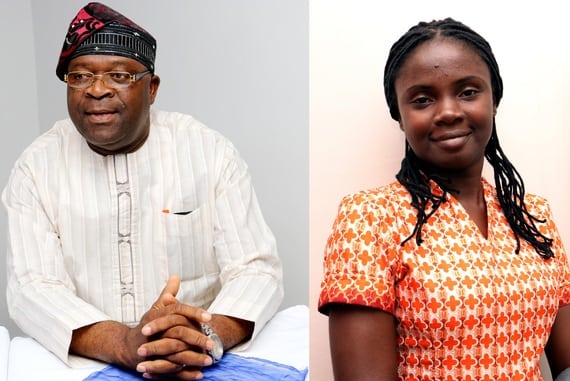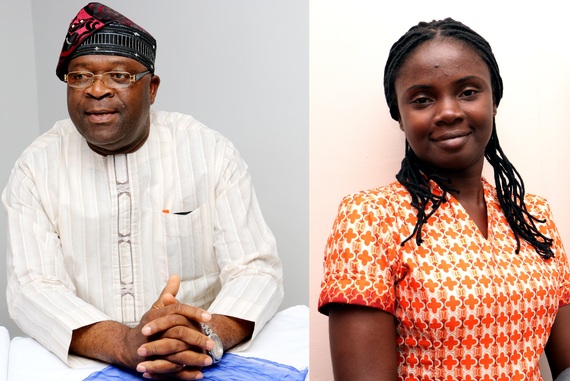An interactive discussion with Oluwatoyin Owolabi and Wilson Imongan of Women’s Health and Action Research Centre, an NGO which works to promote the SRH and social well-being of women and adolescents.
Champions for Change (C4C) is pleased to continue our ‘Meet the Champions’ Series. This bi-monthly blog series highlights the work of 24 Nigerian leaders currently participating as C4C champions. C4C’s Champions in Nigeria are working together to save the lives of mothers, children, and young women through innovative advocacy and leadership development. Nigeria is Africa’s largest economy, and yet tens of thousands of women and children die there each year due to lack of maternity care, preventable disease, and poor health infrastructure, among other causes. This series brings a diversity of perspectives from around Nigeria to the table to discuss this critical moment in Nigeria’s history and how Nigerians can work together to build a healthy future for all.
The series continues with an interactive discussion with Oluwatoyin Owolabi and Wilson Imongan of Women’s Health and Action Research Centre (WHARC), a non-governmental organization which works to promote the sexual and reproductive health and social well-being of women and adolescents (especially girls) through research, documentation, evidence-based advocacy and service delivery. WHARC is based in Benin City, and the organization has a national geographical focus and implements activities in all six geo-political zones.
C4C: Tell us a little bit about yourself…
Toyin: I am the first child of my parents; I was in fact an only child for 14 years before my brother was born. I have a Bachelor of Science in Zoology from University of Ado Ekiti and a Masters of Public Health in Health Promotion and Education from University of Ibadan. I work as a Senior Program Officer in WHARC, and I coordinate the Research and Programs Unit of the organization.
Wilson: I was born and raised in a remote village called Ivbieleke in Owan West LGA of Edo State where I had my primary school education. I was born into a polygamous home where I am the last of six boys by my mother. After a very interesting secondary school education in a nearby rural community, I moved over to Lagos where I worked with Nigeria’s Broadcasting Corporation Television for one year before high school in Lagos and attending the University of Ibadan. I later went to University of Wales, Cardiff for a Diploma in Dermatological Science.
C4C: What led to your involvement in RMNCH work? What is the one issue you are most passionate about in the field of RMNCH?
Wilson: In the year 2000, while working with the Edo State Government, I was assignment the responsibility of coordinating Reproductive Health activities in the State Ministry of Health. There, the realities of reproductive health challenges in the State coupled with my relationship with Prof. Friday Okonofua, a very passionate women’s health advocate, influenced my involvement. I am most passionate about gender equality and look forward to the day gender will be mainstreamed in our policies.
Toyin: Growing up, I always wanted to work in a hospital either as a Pharmacist or a Medical Doctor. When that did not work I decided that if I cannot help care for the sick I should be able to help prevent people from getting sick in the first place, so I opted for public health, which is really preventive medicine. Later, in the course of my training and field experience, the area of RMNCH became more interesting to me. I’m most passionate about gender equality and would like to see a society where women can exercise their reproductive health rights without fear and doubt.
C4C: Why did you opt to be part of the PHI/C4C program? What skills do you hope to acquire and what do you intend to do with these new knowledge and skills?
Toyin: I became a part of the C4C program because it presented an opportunity to broaden my knowledge and skills in the area of RMNCH. I hope that at the end of the C4C program I will have acquired advanced advocacy and communication skills which I will utilise in making meaningful contributions to provide lasting solutions to the various RMNCH challenges in the Nigerian society.
Wilson: I joined the C4C program to increase my capacity (knowledge and skill) to further advocate for RMNCH and, other health policy issues. Through participating I hope to increase my advocacy and leadership skills and contribute to processes of policy development for RMNCH.
C4C: What is the biggest challenge you face in your work?
Wilson: For me the biggest challenges are the deeply rooted negative sociocultural beliefs and practices fuelling gender discriminations which negatively impact RMNCH outcomes.
Toyin: The biggest challenge I have faced is people’s attitude towards positive change due to ignorance as well as cultural and religious beliefs.
C4C: What success are you most proud of in your professional career?
Toyin: A success I am proud of is the integration of youth friendly services into the primary health care systems in Nigeria. I participated in the process of identifying the reproductive health needs of youth and helped in identifying the community barriers to the establishment of the services. These findings contributed to the development of the National Guidelines and framework for integration.
Wilson: I am most proud of the programme for free antenatal care (ANC) and delivery for pregnant women, and free antimalarial treatment for pregnant women and children under the age of 5 years, which was started in Edo State when I was in charge of Health.
C4C: What is the most innovative aspect of the work of your organization?
Wilson: For me it is the use of media (traditional & social) to disseminate RMNCH information’s and the decision to engage prominent national figures as reproductive health champions and speak out in support of RMNCH issues.
Toyin: I agree that the most innovative aspect of my organization’s work is the engagement of social and traditional media for the dissemination of our research findings and projects’ outcomes. In the past, we focused more on publication in scientific journals and conference presentations which have a limited audience. Now, our focus is getting everyone involved through the media and community mobilization, especially the women and adolescents in the communities, who are the beneficiaries of our work.
C4C: Why is advocacy for RMNCH important at the local and national levels in Nigeria
Toyin: Advocacy for RMNCH in communities is important because health care services at this level aer still very poor and sadly the community dwellers do not have the needed skills to demand for their rights. It is also important at the national level because policymakers do not have the necessary information about the health situations in the communities, thereby showing little interest in the improvement of health system. RMNCH advocacy at these levels will contribute to strengthening the health care systems in Nigeria.
Wilson: At the community level, there is ignorance which has disempowered the people, while at the State and National levels, policy decision-makers need information to guide policy to ensure that it is evidence-based.
C4C: What is your vision for the future of Nigerian Health System? What would be different if women, newborns, and children had adequate access to good quality health services and information?
Wilson: My vision for the future of the Nigerian health system is that of a functional health system that delivers equitable quality services, accessible and responsive.
Toyin: I like to see a country where quality health services are made available, accessible and affordable to every Nigerian both in the urban and rural areas. If there is adequate access to good quality health services and information, then we will have a healthy country.
C4C: Please complete this statement: I am a Champion for Change because…
Toyin: …I believe life begins in a woman.
Wilson: …I believe in gender equality.
C4C: My favorite song is…
Toyin: Depends on my mood, so right now it’s ‘Be Okay’ (Glee Cast Version)
Wilson: I love the song “Kete Kete” by Ebenezer Obey
C4C: When I think about my childhood, I feel…
Toyin: …that I want more for my children.
Wilson: …happy and thankful to my eldest brother who so believed in me as a boy.
We invite you to follow us on Twitter at @C4C_Champions and use the hashtag #MeetTheChampions to engage more closely with the blog series, the work of the 24 leaders whose work is being highlighted, and the larger conversation surrounding reproductive, maternal, newborn and child health in Nigeria.
Champions for Change saves the lives of women and children in Nigeria by empowering local leaders and organizations to improve reproductive, maternal, newborn and child health through advocacy, education, storytelling and strategic partnerships. Champions for Change leverages a program model developed by its sister initiative, Let Girls Lead, which has contributed to improved health, education and livelihoods for more than 3 million girls globally since 2009. This powerful model drives change through the passage of national laws, implementation of programs and distribution of funds to ensure access to quality healthcare, education and economic opportunity.
Champions for Change and Let Girls Lead are headquartered at the Public Health Institute in Oakland, CA, a leader in global health and development for 50 years.
Follow Champions for Change on Twitter:www.twitter.com/C4C_Champions



